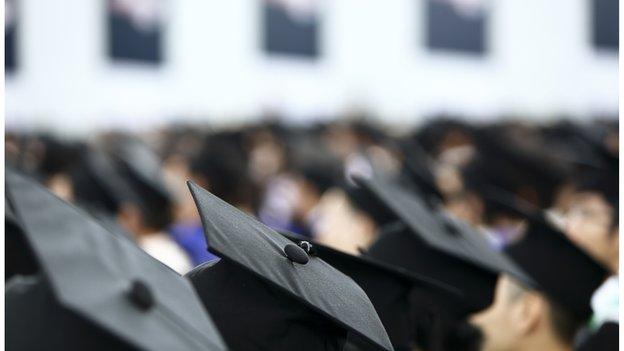Freezing loan threshold 'would cost students thousands'
- Published

Ministers say future graduates must meet more of the costs of their studies once they are earning
Freezing the £21,000 earnings threshold for repaying student loans in England would cost graduates an extra £2,800 over 30 years, the Sutton Trust warns.
The Trust says women would be more affected than men, while those from poor backgrounds would be hit hardest.
It says the freeze would compromise government pledges on social mobility.
In July, Chancellor George Osborne announced a consultation on freezing the threshold, external for five years, rather than linking it with average earnings.
This would affect those who took loans from 2012, when annual tuition fees were raised to a maximum of £9,000 in England.
From next April these so-called "repayment plan 2" graduates whose earnings exceed £21,000 will start to repay the loans.
But the government says updated forecasts from the Office for Budget Responsibility show fewer are likely to start paying than was expected when the policy was introduced, increasing the burden of higher education on the taxpayer.
Uncertainty
The Sutton Trust report, by higher education consultant John Thompson, says freezing the loan repayment threshold - alongside other changes such as replacing maintenance grants for poorer students with loans - will significantly increase the cost of going to university.
It says this risks undermining pledges by successive governments to improve social mobility, as well as raising uncertainty in students' minds over the terms of their borrowing.
The study calculates that the overall extra repayment for a typical borrower taking out a loan of £36,000 over three years would rise by £2,800 over 30 years - up from £30,650 to £33,400.

Women would lose out more than men under the plans, the Sutton Trust argues
The study also notes that women would be affected more adversely than men by any future freeze.
It calculates that if the £21,000 threshold was not frozen, the average male who borrowed £36,000 over three years would pay back £34,900 over 30 years; the average female would pay £26,400.
However, if the five-year repayment threshold freeze came into force, a typical male borrower would pay £37,100 (£2,200 more) over 30 years, while the typical female borrower would repay £29,700 (£3,300 more).
The research says this is because women tend to have lower earnings and are more likely to be paying back money across the full 30-year borrowing period, after which loans are written off.
The Trust says the freezing of the threshold, alongside the changes to maintenance grants, will have a major impact on students from lower income groups, who could see their average debt rise to more than £50,000.
It says loan terms for current borrowers should not be altered and that new borrowers should be given definite terms that will apply to the full repayment period.

The government says fewer graduates than expected will be repaying loans from April 2016
"The danger is that this will have an adverse effect on the willingness of young people to take out the student loans," it says.
'Financial burden'
Sir Peter Lampl, chairman of the Sutton Trust said: "The fact that this measure will adversely affect low earners and graduates from low income homes, who are already being penalised by the budget shift from grants to loans, is a serious cause for concern."

The Sutton Trust says graduates already face a financial burden
The University and College Union said the findings strengthened the case for a proper review of university funding and particularly how the loans system would affect different groups of graduates.
A spokesman for the Department for Business, Innovation and Skills said: "We want our world-class higher education system to remain financially sustainable and welcome responses to our current consultation on the threshold for student loan repayments.
"Our reforms to student finance will mean that students from low-income backgrounds receive a substantial increase in the cash-in-hand to help with living costs whilst at university."
In the July Budget, Mr Osborne also announced the scrapping of the university maintenance grants for lower income students and said the government would link the £9,000 student fee cap to inflation for those institutions that could show they offered high-quality teaching.
- Published8 July 2015
